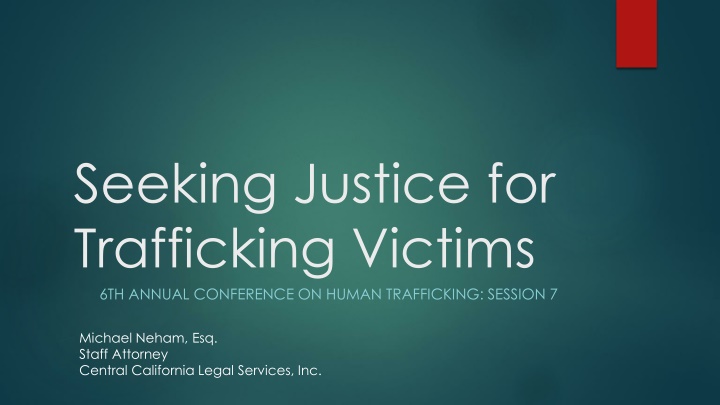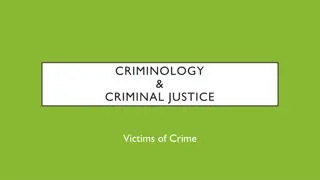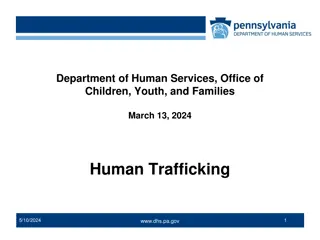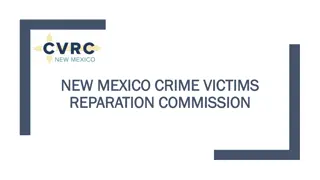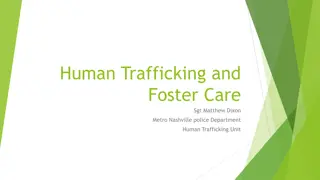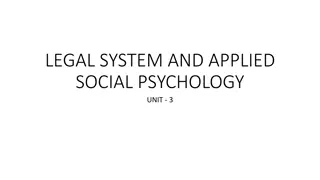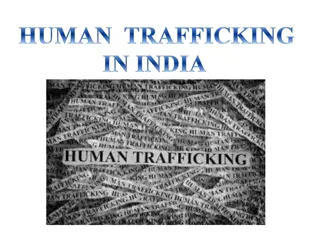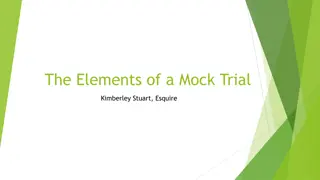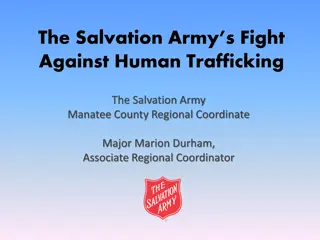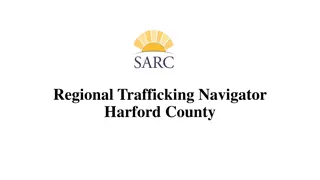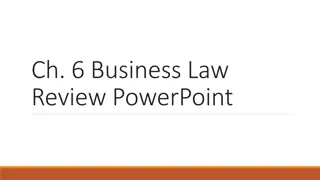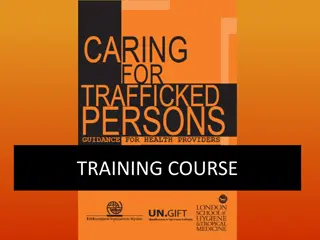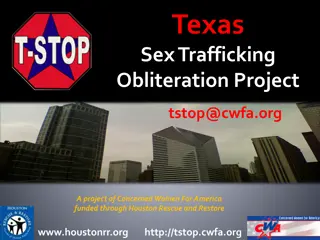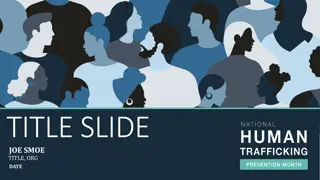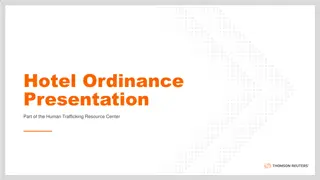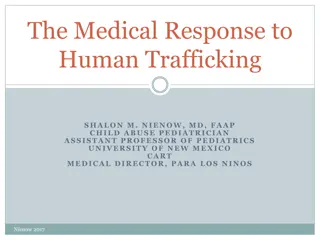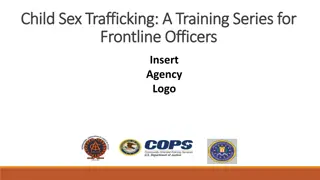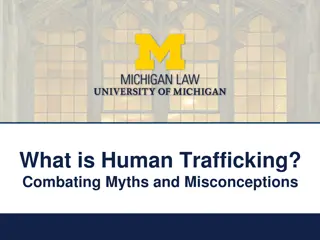Seeking Justice for Trafficking Victims: Criminal vs. Civil Justice Overview
Learn about the distinctions between criminal and civil justice for trafficking victims, including the goals, control of cases, evidentiary standards, and potential outcomes like financial liabilities and punitive damages. Discover key legislative actions such as the Trafficking Victims Protection Act of 2000 and understand the severity of human trafficking through insightful discussions.
Download Presentation

Please find below an Image/Link to download the presentation.
The content on the website is provided AS IS for your information and personal use only. It may not be sold, licensed, or shared on other websites without obtaining consent from the author.If you encounter any issues during the download, it is possible that the publisher has removed the file from their server.
You are allowed to download the files provided on this website for personal or commercial use, subject to the condition that they are used lawfully. All files are the property of their respective owners.
The content on the website is provided AS IS for your information and personal use only. It may not be sold, licensed, or shared on other websites without obtaining consent from the author.
E N D
Presentation Transcript
Seeking Justice for Trafficking Victims 6TH ANNUAL CONFERENCE ON HUMAN TRAFFICKING: SESSION 7 Michael Neham, Esq. Staff Attorney Central California Legal Services, Inc.
Criminal v. Civil Justice Criminal Lawsuits Civil Lawsuits Goal is to hold the defendant accountable to the VICTIM. Goal is to hold the defendant accountable to the GOVERNMENT. Case is initiated and controlled by the victim. Case is initiated and controlled by (state or federal) prosecutor. Victim is a party and is entitled to all important information relating to the case, and can make decisions about the direction of the case such as settlement of the claim. Victim is a witness and does not have the right to direct the prosecution of the case or to veto the prosecutor's decisions. To prevail, the victim must prove by a preponderance of the evidence ( more likely than not ) standard that the perpetrator is liable. To prevail, the state must prove that the perpetrator is guilty "beyond a reasonable doubt.
Criminal v. Civil Justice (cont.) Criminal Lawsuits Civil Lawsuits A successful civil suit can subject the perpetrator to financial liability to the victim for: Economic Damages A successful prosecution can subject the perpetrator to punishment such as probation or jail. Medical and therapy expenses The victim will not obtain money unless the court orders the defendant to pay restitution. Lost Wages Non-economic damages The court cannot order restitution for non-economic damages. Damage to Family Relationships, Pain and Suffering If the perpetrator is found not guilty, the state cannot initiate a second prosecution (double jeopardy). Punitive Pamages. The victim can sue the perpetrator in civil court regardless of whether the perpetrator has been found guilty in a criminal prosecution.
Legislative Action The Trafficking Victims Protection Act (TVPA) of 2000 Criminalizes forced labor; trafficking with respect to peonage, slavery, involuntary servitude, or forced labor; sex trafficking by force, fraud or coercion; or sex trafficking of children; and unlawful conduct with respect to documents in furtherance of trafficking. Establishes the T Visa Allows victims of severe forms of trafficking (and immediate family members) to become temporary U.S. residents, through which they may become eligible for permanent residency after three years. Adult victims must cooperate with law enforcement to be eligible. Victims must show they would suffer extreme hardship if deported. The United States Constitution, Amendment XIII: Section 1. Neither slavery nor involuntary servitude, except as a punishment for crime whereof the party shall have been duly convicted, shall exist within the United States, or any place subject to their jurisdiction. Section 2. Congress shall have power to enforce this article by appropriate legislation.
Federal Prosecutions Initiation & Disposition of Federal Criminal Cases: FY 2011 HUMAN TRAFFICKING 0 50 100 150 200 250 300 Defendants Indicted Defendants Convicted Source: The Attorney General s Annual Report to Congress and Assessment of U.S. Government Activities to Combat Trafficking in Persons, FY 2011, U.S. Department of Justice Office of Legal Policy
Federal Prosecutions Initiation & Disposition of Federal Criminal Cases: FY 2011 HUMAN TRAFFICKING TRAFFIC OFFENSES 0 500 1000 1500 2000 2500 3000 3500 Defendants Indicted Defendants Convicted Sources: The Attorney General s Annual Report to Congress and Assessment of U.S. Government Activities to Combat Trafficking in Persons, FY 2011, U.S. Department of Justice Office of Legal Policy Federal Justice Statistical Tables: 2011, US Department of Justice Bureau of Justice Statistics
Federal Prosecutions Initiation & Disposition of Federal Criminal Cases: FY 2011 HUMAN TRAFFICKING TRAFFIC OFFENSES DRUG TRAFFICKING 0 5000 10000 15000 20000 25000 30000 35000 Defendants Indicted Defendants Convicted Sources: The Attorney General s Annual Report to Congress and Assessment of U.S. Government Activities to Combat Trafficking in Persons, FY 2011, U.S. Department of Justice Office of Legal Policy Federal Justice Statistical Tables: 2011, US Department of Justice Bureau of Justice Statistics
Civil Remedies in the TVPA Ubi Jus Ibi Remedium For every wrong there is a remedy. Cal. Civ. Code 3523 2003 Reauthorization 2008 Reauthorization 18 U.S.C. 1595(a) as amended: An individual who is a victim of a violation may bring a civil action against the perpetrator (or whoever knowingly benefits, financially or by receiving anything of value from participation in a venture which that person knew or should have known has engaged in an act in violation of this chapter) in an appropriate district court of the United States and may recover damages and reasonable attorneys fees. 18 U.S.C. 1595(a): An individual who is a victim of a violation of section 1589 [forced labor], 1590 [recruitment], or 1591 [child sex trafficking] may bring a civil action against the perpetrator in an appropriate district court of the United States and may recover damages and reasonable attorneys fees.
Other Available Civil Actions Against Traffickers Racketeering-Influenced Corrupt Organizations Act (RICO) Thirteenth Amendment and Involuntary Servitude Recognized by some courts as in independent civil cause of action Alien Tort Claims Act The Civil Rights Act Title VII (employment discrimination) Sec. 1985(3) (civil conspiracy to interfere with civil rights) Section 1981 (race or national origin discrimination on contracts) Fair Labor Standards Act Migrant and Seasonal Agricultural Worker Protection Act State torts and contract claims State labor and housing codes
The California Trafficking Victims Protection Act (2005) New Penal Code section 236.1 Severe forms of human trafficking (incorporating the federal definition) classified as a felony. Created a human trafficking caseworker evidentiary privilege. Enhanced mandatory sentencing when offense involves force, fear, fraud, deceit, coercion, violence, duress, menace, or threat of unlawful injury to the victim or to another person. Allows non-economic restitution awards for cooperating victims
Civil Remedies under CTVPA Civil Code 52.5 provides a private right of action for violation of Penal Code 236.1. Allows the victim to sue a trafficker(s) for: Actual damages Compensatory damages Punitive damages Injunctive relief (i.e. restraining orders) any other appropriate relief Treble damages, or $10,000, whichever is greater Attorney's fees and costs. Expert witness fees
Common Hurdles Traumatic stories that change over multiple interviews with law enforcement. Evidentiary disputes and protective orders. The visa defense. Telling the whole story at trial. Cultural and class barriers to settlement. Mixed subjective and objective legal standards. Cascading definitions confusing to juries and judges. Post-judgment collection
Human Trafficking defined Any person who deprives or violates the personal liberty of another with the intent to obtain forced labor or servicesis guilty of human trafficking.
Human Trafficking defined (cont.) Deprivation or violation of the personal liberty of another includes substantial and sustained restriction of another's liberty accomplished through force, fear, fraud, deceit, coercion, violence, duress, menace, or threat of unlawful injury to the victim or to another person, under circumstances where the person receiving or apprehending the threat reasonably believes that it is likely that the person making the threat would carry it out.
Duress Duress includes a direct or implied threat of force, violence, danger, hardship, or retribution sufficient to cause a reasonable person to acquiesce in or perform an act which he or she would otherwise not have submitted to or performed; a direct or implied threat to destroy, conceal, remove, confiscate, or possess any actual or purported passport or immigration document of the victim; or knowingly destroying, concealing, removing, confiscating, or possessing any actual or purported passport or immigration document of the victim.
Forced labor or services Forced labor or services means labor or services that are performed or provided by a person and are obtained or maintained through force, fraud, duress, or coercion, or equivalent conduct that would reasonably overbear the will of the person.
Coercion Coercion includes any scheme, plan, or pattern intended to cause a person to believe that failure to perform an act would result in serious harm to or physical restraint against any person; the abuse or threatened abuse of the legal process; debt bondage; or providing and facilitating the possession of any controlled substance to a person with the intent to impair the person's judgment.
Serious Harm Serious harm includes any harm, whether physical or nonphysical, including psychological, financial, or reputational harm, that is sufficiently serious, under all the surrounding circumstances, to compel a reasonable person of the same background and in the same circumstances to perform or to continue performing labor, services, or commercial sexual acts in order to avoid incurring that harm.
and to make things easier The total circumstances, including the age of the victim, the relationship between the victim and the trafficker or agents of the trafficker, and any handicap or disability of the victim, shall be factors to consider in determining the presence of deprivation or violation of the personal liberty of another, duress, and coercion. Got all that?
Legal Developments surrounding Backpage
Backpage.com v. McKenna On March 29, 2012, Washington Gov. signed SB 6251, which expands criminal liability for the felony of advertising commercial sexual abuse of a minor to anyone involved in publishing an advertisement for a commercial sex act in WA when the individual depicted is a minor.
Backpage.com v. McKenna (Cont.) Backpage s Arguments Preemption by Federal Communications Decency Act (CDA) 47 U.S. Code 230(c)(1) 1st Amendment Free Speech 5th Amendment Due Process Commerce Clause violation
Remember me? An individual who is a victim of a violation may bring a civil action against the perpetrator (or whoever knowingly benefits, financially or by receiving anything of value from participation in a venture which that person knew or should have known has engaged in an act in violation of this chapter) in an appropriate district court of the United States and may recover damages and reasonable attorneys fees. -18 U.S.C. 1595(a)
Does 1-3 v. Backpage.com Allegations: (1) Backpage Is the Largest Purveyor of Online Prostitution and Child Sex Trafficking in the United States (2) Backpage Knowingly Pursued a Scheme to Portray Their Website as a Leader in the Effort to Combat Online Child Sex Trafficking (3) Backpage Provides a Brokering Service that Successfully Matches Buyers and Sellers of Commercial Sex (4) The Backpage Business Model Depends Substantially On Its Success In Minimizing the Scrutiny of Traffickers By Law Enforcement Agencies (5) The Backpage Defendants Have Adopted Tools That Are Specifically Intended to Assist Advertisers in Crafting Child Sex Advertisements That Will Attract Potential Customers Yet Evade Law Enforcement Detection.
Does 1-3 v. Backpage.com Civil Lawsuit alleges that Backpage coaches traffickers on how to avoid detection by law enforcement
Questions? Michael Neyham, Staff Attorney Central California Legal Services, Inc. mneham@centralcallegal.org 209-386-1690 To serve justice and empower people.
